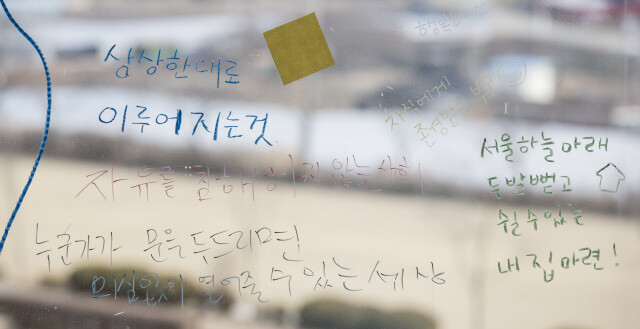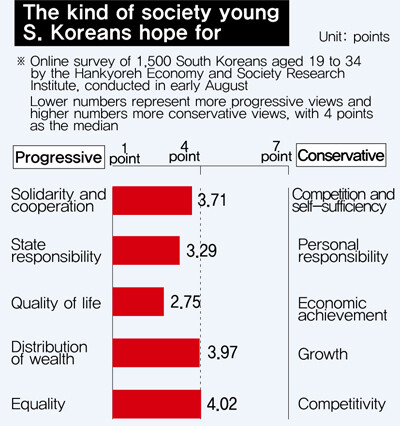hankyoreh
Links to other country sites 다른 나라 사이트 링크
Survey: Young S. Koreans turn to quality of life over economic achievement

Solidarity and cooperation over competition and self-sufficiency. Quality of life over economic achievement. State responsibility over individual responsibility in matters of risk.
These were the values identified in an early August surveys of attitudes among 1,500 South Koreans aged 19 to 34 by the Hankyoreh Economy and Society Research Institute. The findings calculated them in terms of “value units,” quantifications of young people’s desired value orientation for South Korean society in five major areas, including economy, society, and culture. Numbers closer to one represent more progressive values; those closer to seven show a preference for conservative values.
For an item in which respondents were asked to choose between “a society that prioritizes solidarity and competition” and “a society that prioritizes competition and self-sufficiency,” the value unit of 3.71 fell below the middle value of four. The number was seen as a signal that young people who are exposed to this relentless competition for university entrance and employment are yearning for a society of togetherness.
When asked whether they preferred “a society that values quality of life” or “a society that values economic success,” participants overwhelmingly chose the former. Indeed, it showed the strongest progressive skewing among all items investigated, with a value unit of 2.75. The number reads as evidence of a clear “post-materialist” shift toward self-actualization and happiness, in contrast with previous generations’ life goals of wealth and success.
How did younger people view the issue of individual vs. state responsibility?

Respondents showed a preference for a “society in which state responsibility is valued, e.g. through social security against risks, even if it means more taxes” over a “society where individuals pay less taxes but bear greater responsibility to protect themselves against risks,” with a value unit of 3.29. The results show that younger people see the state’s responsibility as mattering more in an environment where risk and uncertainty factors are multiplying beyond individuals’ ability to cope with them.
Respondents’ value unit for “a society that places greater value on distribution” and “a society that places greater value on growth” was an average 3.97. Responses for another item on “an equal society in which individuals complement each others’ differences in abilities” and “a competitive society that recognizes differences in individual ability and values competition” were similarly close to average at 4.02. The results appear to show realistic, complex views emphasizing growth and competition as much as distribution and equality among a younger generation that is bearing the brunt of suffering from low growth and polarization.
One of the most noteworthy results from the survey was the difference in social ideals among young people according to their parents’ economic status. Typically, respondents leaned more conservative when their parents were wealthier and more progressive when their parents were poorer. The findings stand in contrast with the frequent conclusion from political surveys that poorer respondents tend to be more conservative - suggesting instead a relatively strong sense of class consciousness based on individual economic status.
Young people also expressed hopes that South Korean society will have become more progressive when they become the “establishment” themselves. When respondents were asked what kind of society they hoped to live in when they were in their forties and fifties, value units were more progressive for all five categories, including solidarity and cooperation (3.23) and quality of life (2.55).
“The younger generation is sensing that South Korean society is unsustainable with the values of growth and competition that the establishment generation has depended upon absolutely,” said Shin Yun-jeong, director of policy for the organization Youth Hub.
“We need to begin our youth policy from a place of incorporating these values among young people, with all of society working wholeheartedly to find new directions,” Shin advised.
Some analysts saw the findings as heralding changes in the values that have long dominated South Korean society. While the country has ranked as “most materialistic” among members of the Organization for Economic Co-operation and Development (OECD), values are rapidly shifting as members of the younger generation adopt a more post-materialist, pro-distribution orientation.
“Things like growth, competition, and materialism constituted the driving force that led South Korea to achieve growth at a very fast rate, but they’re also the sources of the problems that confront society today,” said Seoul National University sociology professor Chang Duk-jin.
“The changes in young people’s values are positive in that they suggest the possibility of change in our society, but there’s also a lot of potential for conflict because we could end up seeing clashes in values between the older and younger generations,” Chang added.
By Han Kwi-young, Hankyoreh Economy & Society Research Institute
Please direct questions or comments to [english@hani.co.kr]

Editorial・opinion
![[Column] Samsung’s ‘lost decade’ and Lee Jae-yong’s mismatched chopsticks [Column] Samsung’s ‘lost decade’ and Lee Jae-yong’s mismatched chopsticks](https://flexible.img.hani.co.kr/flexible/normal/500/300/imgdb/original/2024/0512/3017154788490114.jpg) [Column] Samsung’s ‘lost decade’ and Lee Jae-yong’s mismatched chopsticks
[Column] Samsung’s ‘lost decade’ and Lee Jae-yong’s mismatched chopsticks![[Correspondent’s column] The real reason the US is worried about Chinese ‘overcapacity’ [Correspondent’s column] The real reason the US is worried about Chinese ‘overcapacity’](https://flexible.img.hani.co.kr/flexible/normal/500/300/imgdb/original/2024/0510/5217153290112576.jpg) [Correspondent’s column] The real reason the US is worried about Chinese ‘overcapacity’
[Correspondent’s column] The real reason the US is worried about Chinese ‘overcapacity’- [Editorial] Yoon’s gesture at communication only highlights his reluctance to change
- [Editorial] Perilous stakes of Trump’s rhetoric around US troop pullout from Korea
- [Guest essay] Preventing Korean Peninsula from becoming front line of new cold war
- [Column] The state is back — but is it in business?
- [Column] Life on our Trisolaris
- [Editorial] Penalties for airing allegations against Korea’s first lady endanger free press
- [Editorial] Yoon must halt procurement of SM-3 interceptor missiles
- [Guest essay] Maybe Korea’s rapid population decline is an opportunity, not a crisis
Most viewed articles
- 1Seoul’s plan to adopt SM-3 missiles is like wanting a sledgehammer to catch a fly
- 2[Column] Samsung’s ‘lost decade’ and Lee Jae-yong’s mismatched chopsticks
- 3‘We must say no’: Seoul defense chief on Korean, USFK involvement in hypothetical Taiwan crisis
- 4[Correspondent’s column] The real reason the US is worried about Chinese ‘overcapacity’
- 5S. Korea “monitoring developments” after report of secret Chinese police station in Seoul
- 6Yoon voices ‘trust’ in Japanese counterpart, says alliance with US won’t change
- 7Yoon rejects calls for special counsel probes into Marine’s death, first lady in long-awaited presse
- 846% of cases of violence against women in Korea perpetrated by intimate partner, study finds
- 9N. Korean delegation’s trip to Iran shows how Pyongyang is leveraging ties with Moscow
- 10Korea poised to overtake Taiwan as world’s No. 2 chip producer by 2032